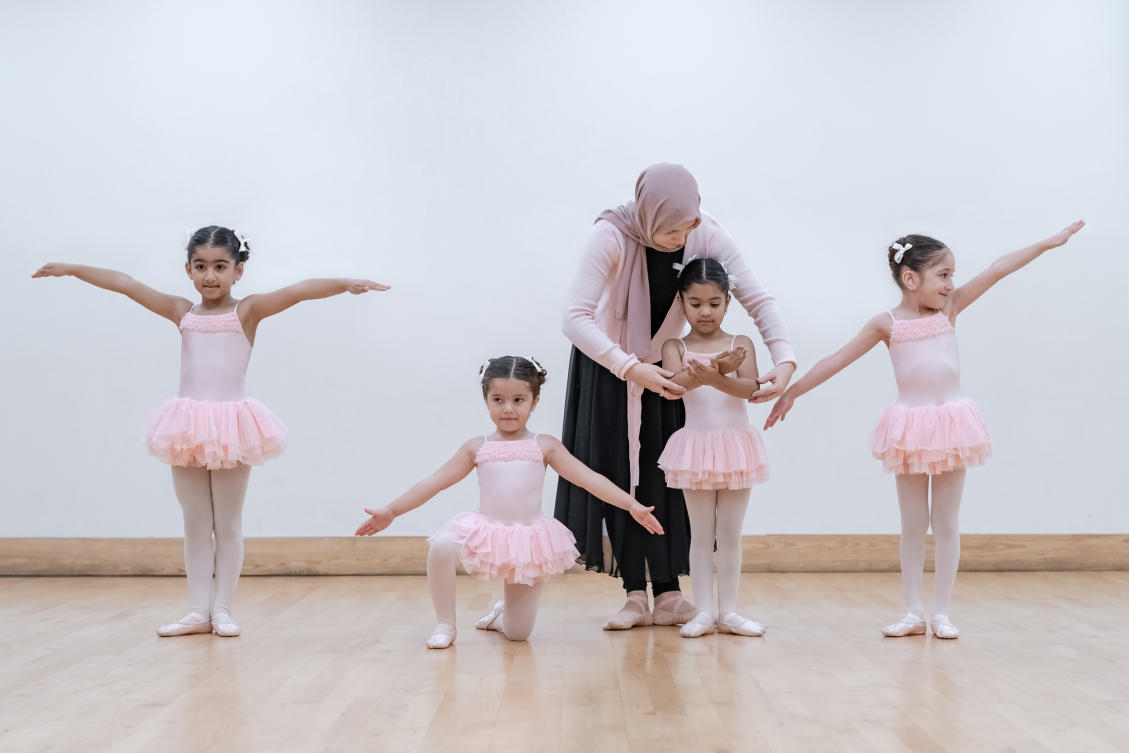LONDON: A Muslim ballet school in London that uses poetry to accompany dance has set its sights on expanding to countries with large Muslim populations, with “Saudi Arabia definitely on the list.”
Grace & Poise Academy aims to offer ballet to the Muslim community in an artistic way that allows girls to “train professionally within the boundaries of Islam.”
Poetry accompanies ballet movements instead of music and classes are female-only at the school which was established in 2019.
“We are hoping to expand to Muslim-majority countries to make ballet more accessible to the Muslim community, and Saudi Arabia is definitely on the list because of the population there. We’ve also had inquiries from countries such as Malaysia and we want to expand as much as we can,” said founder Maisie Alexandra Byers.
“When I originally looked at opening the school, I couldn’t find anything that had been done in this way before and that’s why I want to expand internationally,” she added.
Byers, 26, who has a life-long passion for the artistic dance and a degree in ballet education from the Royal Academy of Dance, founded the academy after “falling in love with Islam” and converting to the religion three years ago.
She set up the school so that she could continue her career in ballet teaching while practicing her newfound faith. Byers also wanted to make the dance “accessible to Muslims and accommodating of their values.”
“It was an interesting change because I had lived a lifestyle working within ballet that might have been difficult for me to continue. Setting up this company has allowed me to have my professional development as well as pave the way for others to do the same if they are passionate about ballet,” Byers explained.
“I started exploring poetry and working with poetry — we have a ballet poetry syllabus and don’t work with music. For those Muslims who don’t listen to music, that’s fine as we don’t use it and for those who do listen to it then it’s still a unique and beneficial way of working as an artistic approach in its own right,” she said.
Byers said that while a normal syllabus would couple ballet movement with music, using “poetry complements the understanding of that movement development.”
The director writes the poetry herself and “it is written to actually work with the choreography specifically. We play a recording of the poetry, recited by myself, and the girls do the exercises to the poetry. It’s tailored to the movements.
“There are a lot of benefits of ballet in terms of the cognitive engagement with the poetry, also the physical development; you’re gaining posture, alignment, control, stability, coordination. With the poetry, we also have the emotional wellbeing of the child, the expression of telling the story, and the facial element, too. These are fundamental skills.”
Byers is passionate about making ballet accessible to girls from impoverished backgrounds and giving them transferable skills that will help them change their financial circumstances.
“There are a lot of children who can massively benefit holistically from physical, cognitive, emotional and social development through something like ballet but are not given that opportunity mainly because parents are not in a position to fund extracurricular activities outside of school,” she said.
“The big challenge is how to make activities that are beneficial to the Muslim community more accessible in terms of financing and things like that.”
Another challenge that she faces is the lack of value that some people place on the performing arts as opposed to academic subjects such as science and maths.
“Many people haven’t been exposed to ballet for various reasons and may not initially be able to see what the benefits are. Unless you work in education, some of the benefits of ballet may not be obvious, and sometimes there is a big emphasis on STEM subjects (science, technology, engineering and mathematics) rather than creative subjects,” said Byers.
That hasn’t stopped Byers’ academy from flourishing and it operates from four sites across London.
She also works with Islamic schools that offer ballet classes as part of physical education.
“A lot of Islamic schools particularly like what we do because they understand the educational value of ballet. They see the depth of the learning and how it is cross-connected in various ways, and so they really value that on a deeper level, which is what I think we are slowly doing — educating many people about the deeper value,” Byers said.








0 التعليقات:
إرسال تعليق